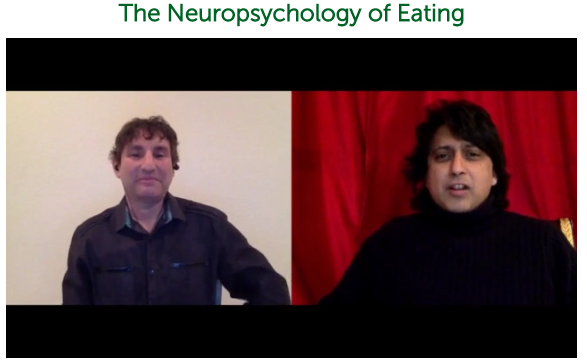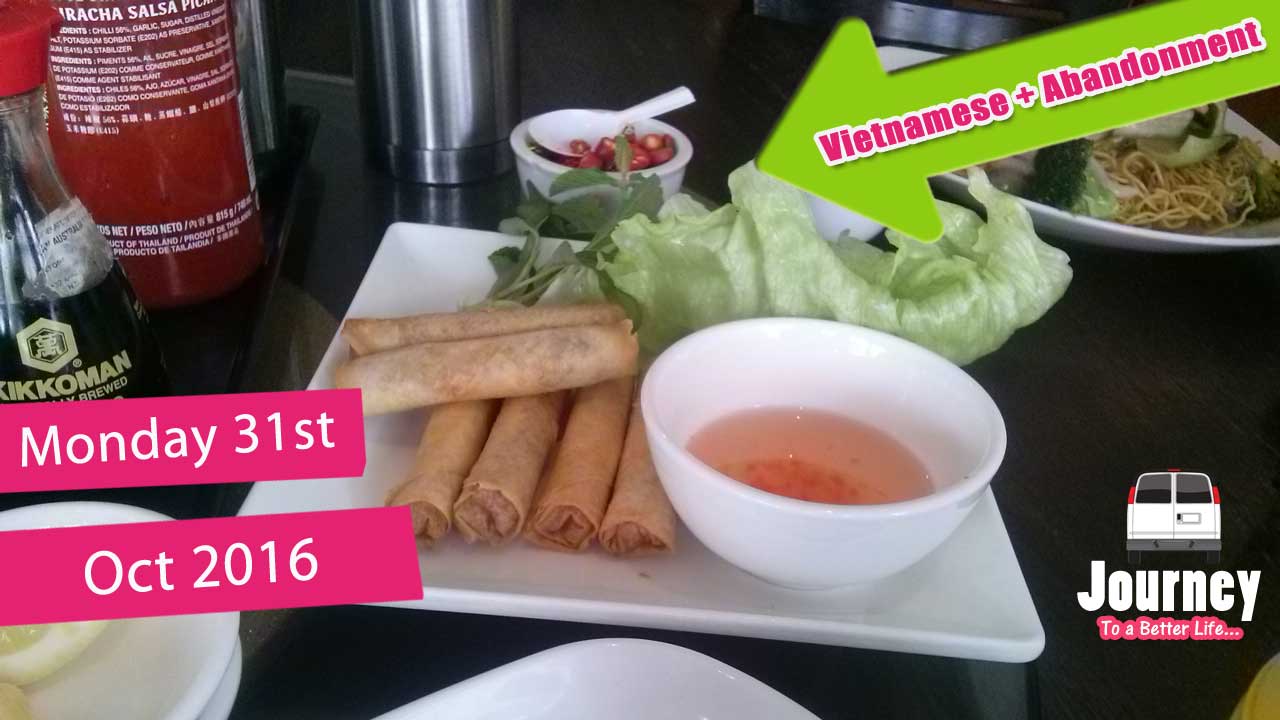The Neuropsychology of Eating ~ Dr. Srini Pillay [Notes]

My notes from The Neuropsychology of Eating ~ Dr. Srini Pillay
Brain is resistant to change but wired TO change
To have a place where the ‘observing self’ and the ‘experiencing self’ is as One. // takes a long time
In the process of learning, trying to be self-reflective is important.
If you’ve been doing something over and over again in the same way, to change the way the brain is doing that is challenging – in order to remain committed to a new way of thinking, you have to activate your left-frontal cortex.
# of different ways to access this, one powerful way:
- Alternative A – brain has certain relationship, knows advantages/disadvantages
- Alternative B – where you want to go – brain knows advantages/disadvantages
- To remain committed to new pathway / stimulate this left-frontal cortex, you have to spread between the two.
- So your brain is very clear why now-sucks and the future-is-great.
You have to be emotionally engaged with “WHY”.
The way we self-message. We often say “I want to change, but now is fine” because we want to also be optimistic.
You tell your brain you want to change, but you say “But now is ok”
So brain is like? Do you want to change or do you want to ‘not’ change?
We need to admit to that.. as much as “now is ok”, it’s very much “not ok”.
And once the brain knows the spread between where you are and where you want to be – it knows that there is a big difference – the “bigger” the spread, the more the left-frontal cortex activates to take you to your goal.
In order to create that spread, to really accept that you want to change, to create that you ‘want something different’ you gotta give up switch-cast, which is the price you pay for change.
It’s not just about pro’s and con’s “oh i see why the future’s great, let me go for that”.. your brain is not going to buy it unless you tell the brain: “look, I know the future is going to be more frightening, I know it’s unfamiliar, I know I’m not going to be good at doing it – you list all the things that are frightening you about the change, and then you deliberately and consciously tell your brain “despite that – I want that”.
Then your brain is like “oh ok – so you want me to do something that is going to ‘freak you out’? And you’re cool with that?” and you say “yeah, Im actually cool with that… because… the payout at the other end is so much greater, that this is just like paying emotional money to get to the other side”.
Why the future is better than now:
–
–
–
–
–
When you start to feel uncomfortable… worried, bit angry, irritable, etc..
The temptation is to fight it, or to come to terms with it, by rationalizing it.
One of the ways to deal with that is to ask ourselves:
“Is there a better way to be thinking about this discomfort?”
Because the first thing we think is “discomfort means a ‘bad’ thing; I’m a bad person; I’m wrong”.. in fact, “discomfort is discomfort”.
If you look at it, its just a certain kind of restlessness, and if you ask yourself “what’s the message that my brain is trying to give me?”
My brain is telling me that it’s used to something and that’s why it’s going to stay ‘stuck there’.
And I’m gonna say “Dear Brain: I love you, but we’re going to need to go to this discomfort to get to the other side – trust me – it will be worth it”
“Brain-tissue has the capacity to make up excuses for incapacity.”
The brain is an excuse-making machine.
People who have a blood-clot in the right-side of the brain, they cannot move the left-side of the body. But if you ask them to move their left leg or something, they don’t say they can’t do it, they say “I don’t “FEEL” like it”
When human-beings have an ‘incapacity’, they will often say “I don’t feel like doing it’.
Once you know that fact, it will make you question everything that you are associating with your nature.
Should I change or should I not change?
I would say life is one big experiment. Spirituality, notion of God that way, relationships, etc.. its really about experimenting with how you can reach deeper & deeper levels of your own consciousness. The brain-piece is just one-piece of that.
If you’re authentically connected with your goal, the brain’s much more on-board.
1.) Resolve goal-intentions into implementation-intentions. Make things more specific. Put it in a schedule.
2.) Remember that an intention is not just an intellectual statement, it needs to involve your true and authentic emotions, and if you’re not there – don’t force it – just think about it. When you articulate your intentions, speak to yourself with emotion that’s authentic.
3.) Manage your goals rather than just setting them because a goal has a life of it’s own & it will serve itself & not you. Goals in your brain are just patterns of neurological information – along the way – i.e. I want to lose 10 pounds.. your brain – that goal – starts operating independently of your overall well-being. Don’t just have a goal, manage the goal. Don’t assume that your goal is a priority is in your brain. Emotionally it’s embedded in your brain.
The more we connect to who we are.
The long-term memory in the hippocampus, which is just where memories are stored, has pictures – it’s like a museum – it has pictures of ourselves that are hung up in the museums of our minds.
We tend to ignore the fact that some of these pictures – we didn’t even cure it.
One is a picture of your teacher telling you “you’re no good”
One is another picture of somebody else telling you “you’re too fat”
One is another picture of somebody else telling you “you’ll never get there”
You don’t think about that consciously, but all of these pictures are hanging up in the memory banks of your brain.
So before you even get to your goal, you really need to go into that museum and see what pictures you curated, and swap some pictures out to pictures that are going to actually help you with your goal.
When you are setting a goal it’s important for it to relate to who you are.
How to stay committed to your goal? One way is to create an image, that is very powerful, of what you want. Because that image stimulates the motor-cortex (which is the action-centre of your brain). When you are constructing that image, it needs to be real and about you. You need to believe that the thing you’re after can happen now.
If you want to be a billionaire, do you have to get a billion dollars before you can start to call yourself a billionaire? Or do you start thinking like a billionaire now?
If you want to lose 20 pounds, do you think of yourself as someone who can lose 20 pounds only after you lose it? Or I’m going to think like a person who can lose 20 pounds; because ‘that’ person would make certain dietary choices, exercise choices, stress-related choices, etc.
Who will you be when you have that result? How is life going to be different?
Describe the ‘new you’.
“I’ll love myself more, I’ll be more engaged, I’ll be out there – I’ll be having more fun” but meanwhile, the road they are choosing to take, to get to that place, is deprivation or self-punishment or self-loathing “I hate this”.. how are you going to end up with self-love if the journey is filled with “not-self-love”?
People who are addicted to alcohol will go into a program, then they’ll stop drinking alcohol, but the psychology has not changed, they are called “dry-drunks”.. they still have the same self-imagery.
The next time you go to the gym, look at people and access the degree of self-love that exists there – there’s not a lot of it. That’s not a reason ‘not to work out’… it’s a reason to work-out differently. Do you really want to motivate yourself with hatred?
The idea that you need to hate yourself in order to look a certain way – and then keep that hatred in- remember, emotions are processed and come through your brain; and your brain is connected to the rest of your body. There’s a reason when you look at any causes of cancer, stress is always somewhere at the top – the feelings and emotions and self-hatred that you feel is all flooding your brain with all kinds of hormones & hormonal interactions that travel down the spinal cord and go to every other part of your body.
Your heart-cells, your hands, your legs, everything is being impacted by what’s going on in your head. That’s not to say that it originates there, but its processing consciousness in some way.
We now know there are so many connections between the heart and the brain, the gut and the brain, gut-bacteria for example have changed significantly in humans, they are evolving at a much slower pace than animals, and they started sending signals to the brain of anxiety, depression, problems-thinking, so when you’re thinking of yourself and your emotions and how you want to drive yourself – remember, all your different organs are connected.
Consider what kind of brain-state you want to have. Self-hatred is not the kind of energy you want to have in your body.
Is self-love possible when you encounter a human who is struggling?
Self-love is not chopping yourself up into pieces, into an observing self and an experiencing self. To experience a one-ness of yourself & a one-ness with the world. When you realize – that’s when you get a sense of ecstasy, that’s when you get a sense of well-being.
How can we make it last longer?
Well-being (meaning & purpose), gets your brain’s reward centre to activate much longer than sex, drugs and rocknroll.
How can we include more contemplation & conversations around meaning & purpose to create this feeling of well-being and activate the brains reward centre for a longer period of time.
What in my life is aligned with my meaning?
Self-love is recognizing your needs and then putting your needs in context & then finding a relationship with the world where you can be in a dynamic interchange with the universe.
Relational – oneness with the world.
Not consciously seeing yourself as separate.
We can do things to enhance this feeling of one-ness.
I think we really feel connected with the world.
When people are synchronized, we have a greater feeling of well-being.
Seeking synchrony with people is a great start.
What is the body? Is the body your ultimate reality or is the body a vehicle so that you can experience a consciousness that is much greater than that? And if you sell your body as a vehicle, then you can change the vehicle. You don’t necessarily look at it as the ultimate truth. The idea is sculpting this vehicle to be able to channel whatever consciousness exists outside of us.
If you look at the world with a golf-ball sized consciousness & you look outside your window, the world will appear to be the size of a golf-ball. If you’re in a relationship & you have a golf-ball sized consciousness, your relationship will be of that size.
As you expand your consciousness, you get away from this “my left arm, and my biceps” – you get more into understanding that the world is so much larger than yourself, and you take the focus off of yourself, and understand yourself as part of something much bigger.
Being real and self-connected and know that being real is not as easy as I’m making it sound, for all intensive purposes, I’m being authentic – but I’m also not telling you my deepest, darkest secrets, and I have a dark-side, and I save it for places where I might feel safer. But I think more and more as feel integrated with all these parts of ourselves, and as we feel like we can be more present in the world as ourselves without having to talk about it, just be it, I think you’ll find that even your hands feel different.
I don’t think it’s what your body is, but what your body is “to you” and how you use it in the world. And I don’t think there are any perfect answers to this, I just think, the value of the kind of dialogue we’re having is to stimulate thoughts in people – and say.. ‘to what extent do I need to forgive myself a little bit more? I’m way too harsh. Let me figure out one or two things where I can say “that’s fine”.. beauty is not just about a structural element of a thing.
The body is an instrument that we can use, to connect more deeply with our own sense of authenticity and reality & the more we do this – the more our concept of who we are will change.
When you can’t change your external reality – this is the beauty of the brain-science, what you see is strongly determined by how you receive it by your brain. So if you change what’s receiving it, you will receive yourself differently.
There is a feeling of surrender and not-knowing. It’s a bit like floating on a pool on a hot-summer’s day. It’s a feeling of ‘trusting’ that if you are genuinely engaged with your journey that your brain will take you to those questions that you need to answer to get somewhere. It’s less about making excuses or trying to look that way or this way, and more about opening up yourself to a life of questions. Because I think answers are great, but questions are the core-drivers of discovery. And I think that this whole field of better psychological health, better physical health, eating habits, etc really has to do with asking more questions and being able to engage each other with these dialogues so that we can figure out for ourselves the changes that we want to make. As long as we stay in questions, we’re on the right path.
www.DrSriniPillay.com
Source: http://futureofhealingconference.com/

Site Notifications/Chat:
- Telegram Post Updates @JourneyToABetterLife (channel)
- Telegram Chatroom @JourneyBetterLifeCHAT (say hi / share info)
- Gettr Post Updates @chesaus (like fakebook)
Videos:





![[Abraham] You are irrelevant to my Joy](https://pennybutler.com/wp-content/uploads/2017/04/world-heart-564x437.jpg)